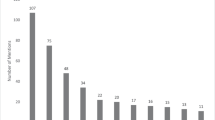Abstract
Scholarly attention has been directed to the spread and scope of online Q&A services, including the level of activity, types and messages and the social roles the members of these sites occupy. A content analysis was conducted of the answers supplied in response to questions aimed at identifying the reasons for Holocaust denial in Yahoo! Answers. The replies denoted the existence of two main opposing online socio-cultural roles adopted by these participants: online gatekeepers of history and online gatekeepers of pseudo-history. The activity levels of those filling these roles and the community’s approval of their answers were also assessed. Future avenues of research regarding these two roles are suggested.
Similar content being viewed by others
References
Atkins, S. E. (2009). Holocaust denial as an international movement. Praeger Publishers.
Blooma, M. J., Goh, D. H. L., & Chua, A. Y. K. (2012). Predictors of high-quality answers. Online Information Review, 36(3), 383–400.
Carmichael, P. (2003). The Internet, information architecture and community memory. Journal of Computer Mediated Communication, 8(2). doi: 10.1111/j.1083-6101.2003.tb00208.x
Charny, I. W. (2000). Innocent denials of known genocides: a further contribution to a psychology of denial of genocide. Human Rights Review, 1(3), 15–39.
Charny, I. W. (2003). A classification of denials of the Holocaust and other genocides. Journal of Genocide Research, 5(1), 11–34.
Daniels, J. (2009). Cloaked websites: propaganda, cyber-racism and epistemology in the digital era. New Media & Society, 11(5), 659–683.
Dror, G., Koren, Y., Maarek, Y., & Szpektor, I. (2011). I want to answer; who has a question?: Yahoo! Answers recommender system. In Proceedings of the 17th ACM SIGKDD international conference on Knowledge discovery and data mining (pp. 1109–1117). New York, NY: ACM Press.
Faraj, S., Wasko, M., & Johnson, S. L. (2008). Electronic knowledge networks: Processes and structure. In I. Becerra-Fernandez & D. Leidner (Eds.), Knowledge management: An evolutionary view of the field (pp. 270–291). Armonk, NY: M.E. Sharpe, Inc.
Gaita, R. (1998). A common humanity. London: Routledge.
Gazan, R. (2006). Specialists and synthesists in a question answering community. Proceedings of the American Society for Information Science and Technology, 43(1), 1–10.
Gerstenfeld, P. B., Grant, D. R., & Chiang, C. P. (2003). Hate online: a content analysis of extremist internet sites. Analyses of Social Issues and Public Policy, 3(1), 29–44.
Harper, F. M., Raban, D., Rafaeli, S., & Konstan, J. A. (2008). Predictors of answer quality in online Q&A sites. In Proceedings of the SIGCHI Conference on Human Factors in Computing Systems (pp. 865–874). New York, NY: ACM Press.
Harper, F. M., Moy, D., & Konstan, J. A. (2009). Facts or friends?: Distinguishing informational and conversational questions in social Q&A sites. In Proceedings of the 27th international conference on Human factors in computing systems (pp. 759–768). New York, NY: ACM Press.
Jones, Q., Ravid, G., & Rafaeli, S. (2004). Information overload and the message dynamics of online interaction spaces: a theoretical model and empirical exploration. Information Systems Research, 15(2), 194–210.
Kim, S. (2010). Questioners’ credibility judgments of answers in a social question and answer site. Information Research, 15(2). Available at: http://InformationR.net/ir/15-2/paper432.html
Kim, S., & Oh, S. (2009). Users’ relevance criteria for evaluating answers in a social Q&A site. Journal of the American Society for Information Science and Technology, 60(4), 716–727.
Klein, A. (2012). Slipping racism into the mainstream: a theory of information laundering. Communication Theory, 22(4), 427–448.
Lang, B. (2010). Six questions on (or about) Holocaust denial. History and Theory, 49(2), 157–166.
Lasson, K. (2007). Defending truth: legal and psychological aspects of Holocaust denial. Current Psychology, 26(3–4), 223–266.
Lazar, A., & Litvak-Hirsch, T. (2009). Cultural trauma as a potential symbolic boundary. International Journal of Politics, Culture and Society, 22(2), 183–190.
Levin, B. (2001). History as a weapon: how extremists deny the Holocaust in North America. The American Behavioral Scientist, 44(6), 1001–1031.
Lipstadt, D. (1993). Denying the Holocaust: The growing assault on truth and memory. New York: Free Press.
Mayring, P. (2000). Qualitative content analysis. Forum Qualitative Sozialforschung/Forum: Qualitative Social Research [On-line journal] 1(2). Available at: http://www.qualitative-research.net/fqs-texte/2-00/2-00mayring-e.htm [retrieved 15.11.2007].
McKinnon, C. (2007). Should we tolerate Holocaust denial? Res Publica, 13, 9–28.
Najarian, J. (1997). Gnawing at history: the rhetoric of Holocaust denial. The Midwest Quarterly, 39(1), 74–89.
Rassin, E., van Rootdelaar, A. F., van der Heiden, S., Ugahary, A., & Wagner, S. (2005). Nazi cruelties: Are they literally hard to imagine? British Journal of Social Psychology, 96(3), 321–330.
Shah, C., Oh, J. S., & Oh, S. (2008). Exploring characteristics and effects of user participation in online social Q&A sites. First Monday, 13(9). Available at: http://firstmonday.org/ojs/index.php/fm/article/view/2182/2028. Accessed 05 Jan 2013. doi: 10.5210/fm.v13i9.2182.
Shermer, M. & Grobman, A. (2009). Denying history: Who says the Holocaust never happened and why do they say it? University of California Press.
Turner, T. C., Smith, M. A., Fisher, D., & Welser, H. T. (2005). Picturing Usenet: Mapping computer–mediated collective action. Journal of Computer–Mediated Communication, 10(4). doi: 10.1111/j.1083-6101.2005.tb00270.x
Walter, J. B., & Jang, J.-W. (2012). Communication processes in participatory websites. Journal of Computer-Mediated Communication, 18(1), 2–15.
Yahoo! Answers (n.d). Points and levels. http://answers.yahoo.com/info/scoring_system
Author information
Authors and Affiliations
Corresponding author
Rights and permissions
About this article
Cite this article
Lazar, A., Hirsch, T.L. Online Gatekeepers of History: Yahoo! Answers Community Discussing Holocaust Denial. Curr Psychol 32, 281–296 (2013). https://doi.org/10.1007/s12144-013-9183-4
Published:
Issue Date:
DOI: https://doi.org/10.1007/s12144-013-9183-4




